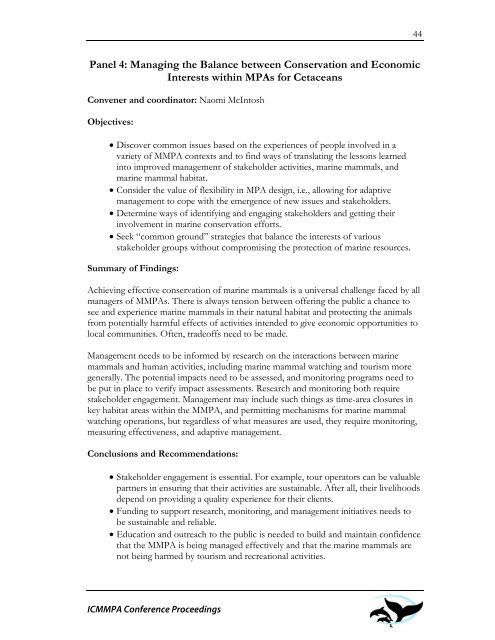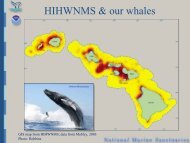The First International Conference on Marine Mammal Protected Areas
The First International Conference on Marine Mammal Protected Areas
The First International Conference on Marine Mammal Protected Areas
You also want an ePaper? Increase the reach of your titles
YUMPU automatically turns print PDFs into web optimized ePapers that Google loves.
Panel 4: Managing the Balance between C<strong>on</strong>servati<strong>on</strong> and Ec<strong>on</strong>omic<br />
Interests within MPAs for Cetaceans<br />
C<strong>on</strong>vener and coordinator: Naomi McIntosh<br />
Objectives:<br />
• Discover comm<strong>on</strong> issues based <strong>on</strong> the experiences of people involved in a<br />
variety of MMPA c<strong>on</strong>texts and to find ways of translating the less<strong>on</strong>s learned<br />
into improved management of stakeholder activities, marine mammals, and<br />
marine mammal habitat.<br />
• C<strong>on</strong>sider the value of flexibility in MPA design, i.e., allowing for adaptive<br />
management to cope with the emergence of new issues and stakeholders.<br />
• Determine ways of identifying and engaging stakeholders and getting their<br />
involvement in marine c<strong>on</strong>servati<strong>on</strong> efforts.<br />
• Seek “comm<strong>on</strong> ground” strategies that balance the interests of various<br />
stakeholder groups without compromising the protecti<strong>on</strong> of marine resources.<br />
Summary of Findings:<br />
Achieving effective c<strong>on</strong>servati<strong>on</strong> of marine mammals is a universal challenge faced by all<br />
managers of MMPAs. <str<strong>on</strong>g>The</str<strong>on</strong>g>re is always tensi<strong>on</strong> between offering the public a chance to<br />
see and experience marine mammals in their natural habitat and protecting the animals<br />
from potentially harmful effects of activities intended to give ec<strong>on</strong>omic opportunities to<br />
local communities. Often, tradeoffs need to be made.<br />
Management needs to be informed by research <strong>on</strong> the interacti<strong>on</strong>s between marine<br />
mammals and human activities, including marine mammal watching and tourism more<br />
generally. <str<strong>on</strong>g>The</str<strong>on</strong>g> potential impacts need to be assessed, and m<strong>on</strong>itoring programs need to<br />
be put in place to verify impact assessments. Research and m<strong>on</strong>itoring both require<br />
stakeholder engagement. Management may include such things as time-area closures in<br />
key habitat areas within the MMPA, and permitting mechanisms for marine mammal<br />
watching operati<strong>on</strong>s, but regardless of what measures are used, they require m<strong>on</strong>itoring,<br />
measuring effectiveness, and adaptive management.<br />
C<strong>on</strong>clusi<strong>on</strong>s and Recommendati<strong>on</strong>s:<br />
• Stakeholder engagement is essential. For example, tour operators can be valuable<br />
partners in ensuring that their activities are sustainable. After all, their livelihoods<br />
depend <strong>on</strong> providing a quality experience for their clients.<br />
• Funding to support research, m<strong>on</strong>itoring, and management initiatives needs to<br />
be sustainable and reliable.<br />
• Educati<strong>on</strong> and outreach to the public is needed to build and maintain c<strong>on</strong>fidence<br />
that the MMPA is being managed effectively and that the marine mammals are<br />
not being harmed by tourism and recreati<strong>on</strong>al activities.<br />
ICMMPA <str<strong>on</strong>g>C<strong>on</strong>ference</str<strong>on</strong>g> Proceedings<br />
44



